Biblical revivals reshaped history; delve into these transformative events and explore their profound impact on both individual lives and humanity's spiritual journey.

Examples of Revival in the Bible
Elijah on Mount Carmel, Jonah in Nineveh, King Josiah in Jerusalem, Nehemiah rebuilding the walls, and the Pentecost sparking the birth of the Church – these are but a few instances of revival in the Bible.
You may have heard these stories before, but have you ever really examined them in the context of revival? Let's unravel these narratives together and uncover the deeper meanings they offer.
How did these moments shape not just the lives of those involved, but the course of human history?
Key Takeaways
- The Bible contains numerous examples of revivals, such as Elijah's Mount Carmel Revival and Nehemiah's Jerusalem Restoration.
- Faith, repentance, and commitment to God are central themes in these biblical revival accounts.
- Divine interventions and manifestations, like Elijah's encounter with fire from heaven, often accompany revivals.
- These revivals often lead to transformation and renewal, playing significant roles in Christian history, such as the birth of the Church at Pentecost.
Elijah and the Mount Carmel Revival
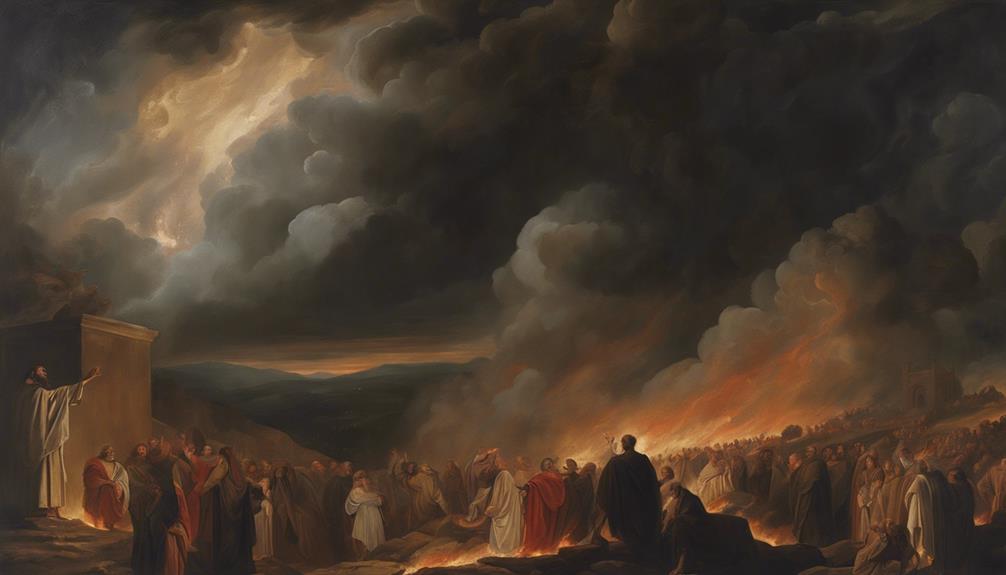
In the narrative of Elijah at Mount Carmel, we observe a potent example of a biblical revival, wherein the prophet challenges the prophets of Baal in a dramatic contest of divine power. This Carmel Showdown is a testament to Elijah's faith, a pivotal point in the Old Testament where Elijah's resolve doesn't waver in the face of overwhelming odds.
You see, Elijah's faith isn't a blind belief but a conviction rooted in his relationship with God. He bravely opposes the status quo, confronting the corruption within King Ahab's regime. His audacious faith isn't only resilient but also transformative, sparking a spiritual awakening among the Israelites.
The Carmel Showdown is a vivid display of divine intervention, where God's power is visibly manifested. Elijah's prayer yields a miraculous response, as fire from heaven consumes the sacrifice, the wood, the stones, the soil and even the water in the trench. This dramatic display of divine power serves as a catalyst for the Israelites' return to God.
In essence, Elijah's faith and the Carmel Showdown provide a compelling narrative of biblical revival. They illustrate the transformative power of unwavering faith in the face of adversity, a key theme in biblical revivals.
Jonah's Message to Nineveh

Shifting our gaze from Elijah's audacious faith, let's consider another striking instance of biblical revival: Jonah's prophetic message to the city of Nineveh. Despite Jonah's resistance, God's message of judgement was clear and unyielding. Yet, it was Nineveh's repentance that truly epitomizes revival.
In the face of impending doom, Nineveh's reaction was profound, unexpected, and marked by a swift, collective return to God. This repentance was so deep and pervasive that even the king, from his throne, issued a decree of fasting and mourning, echoing the repentant heart of his subjects.
Aspect |
Description |
Significance |
|---|---|---|
Jonah's Resistance |
Jonah initially fled from God's command to prophesy Nineveh's destruction |
Illustrates human frailty and reluctance to heed divine instructions |
Nineveh's Repentance |
The city repented en masse, from the king to the commoner |
Demonstrates the power of God's message to inspire profound change |
God's Mercy |
Despite the prophecy, God spared Nineveh after their repentance |
Reinforces God's unending mercy when met with sincere repentance |
This account reveals that even in the midst of judgement, grace abounds, repentance is possible, and revival can be ignited. It underscores the power of prophetic messages and the efficacy of repentance.
King Josiah's Reformation
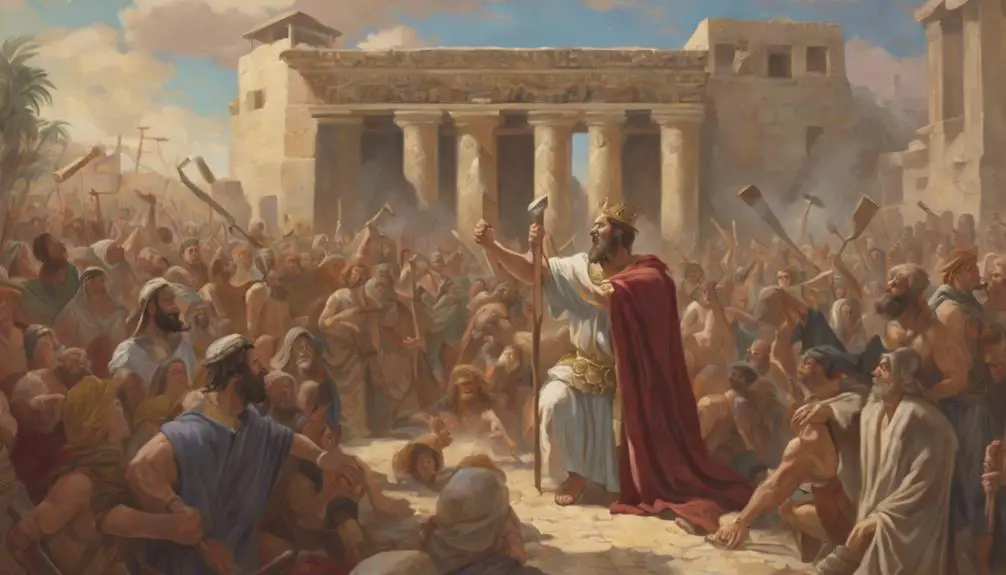
Let's delve into King Josiah's reformation, a pivotal event that marked a remarkable revival in the Bible's historical accounts. Josiah's leadership was instrumental in this reformation, as he initiated religious changes that led to a significant spiritual awakening among the people of Judah.
Josiah became king at a tender age of eight and ruled for 31 years. Despite his youth, he was determined to eradicate idolatry and restore the worship of Yahweh. He removed pagan altars, tore down high places, and purged Judah and Jerusalem of idolatrous priests. His leadership wasn't just about destruction; it also demonstrated a commitment to rebuilding and renewing the spiritual life of the nation.
A critical part of this reformation was the Covenant Renewal. When the Book of the Law was discovered in the temple, Josiah didn't just read it; he acted on it. He led the people in renewing their covenant with God, vowing to follow the teachings in the Book and to serve God with their whole heart and soul. This Covenant Renewal was a significant step in the revival process, demonstrating the people's commitment to turning back to God. Josiah's reformation was a powerful revival, a return to faithful adherence to God's law.
Nehemiah's Jerusalem Restoration
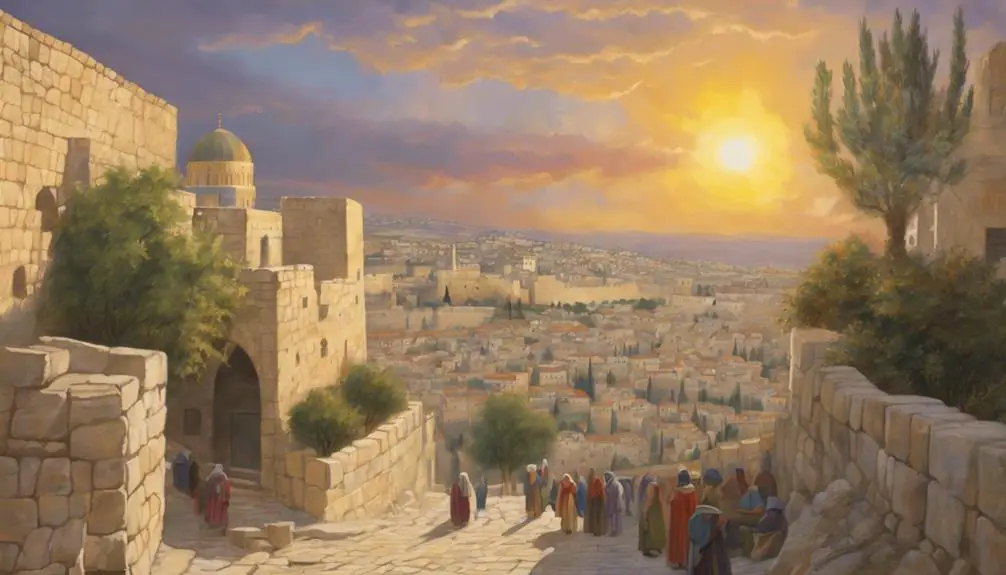
Turning our attention to Nehemiah's Jerusalem Restoration, we find another profound instance of spiritual and physical revival in Biblical history. This restoration was not merely about rebuilding physical walls; it was equally about restoring a people's faith and dedication to God. Nehemiah's leadership played a pivotal role in this process.
Nehemiah was not a builder by trade, yet his wall rebuilding strategies were ingenious. He divided the work among families and clans, each taking responsibility for a section of the wall. This strategy not only expedited the project but also fostered a sense of collective ownership and unity among the people.
Aspect |
Description |
Impact |
|---|---|---|
Nehemiah's Leadership |
Motivated the people, promoted unity |
Revived community spirit |
Wall Rebuilding Strategies |
Division of work among families, clans |
Accelerated project, fostered ownership |
Result |
Jerusalem's physical and spiritual restoration |
Renewed dedication to God |
With the completion of the walls, the people experienced a spiritual revival. They returned to the laws of Moses, recommitting themselves to God. Nehemiah's Jerusalem Restoration serves as a powerful testament of how faith, leadership, and strategic planning can bring about both physical and spiritual revival.
The Pentecost: Birth of the Church
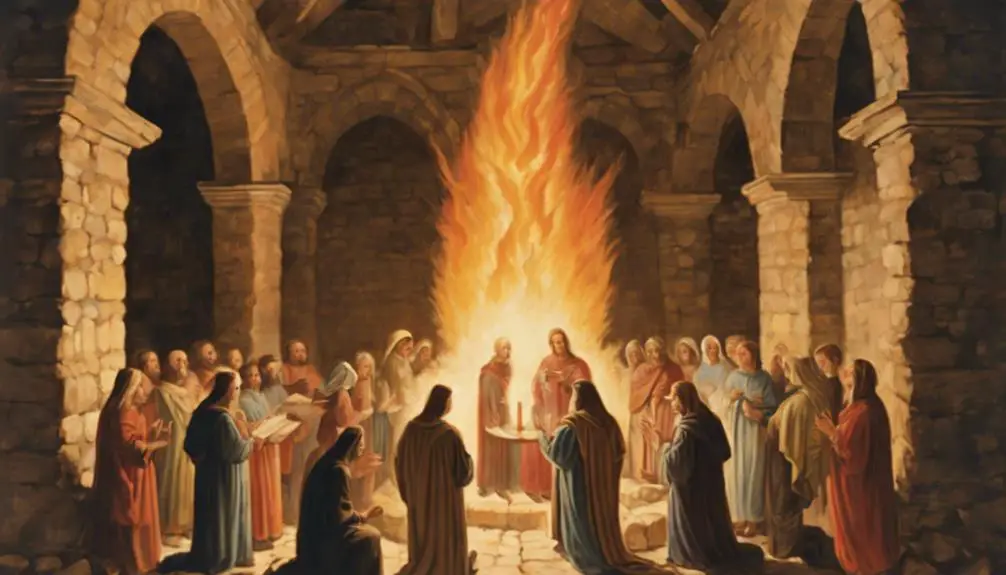
In the wake of Christ's ascension, the Pentecost represents a pivotal moment in the Bible, marking the birth of the Church as the Holy Spirit descended upon the disciples. This event signified a transformative shift in religious history, a spiritual empowerment that had profound implications for the early Christian community.
The Holy Spirit's manifestation wasn't a subtle, quiet event. Instead, it occurred with the rush of a violent wind, filling the house where the disciples were seated. This dramatic display of divine power not only solidified the disciples' faith, but it also granted them the ability to speak in different tongues, effectively breaking down linguistic barriers and enabling them to spread the Gospel far and wide.
This spiritual empowerment, bestowed by the Holy Spirit, marked the paradigm shift from a faith based solely on the teachings of Jesus to an active, dynamic faith driven by the Spirit. The Pentecost thus symbolizes a key revival moment, where the disciples were transformed from mere followers to active apostles, equipped to carry out Christ's mission. This historical event marks a significant milestone in Christian history – the birth of the Church.
Frequently Asked Questions
What Are Other Instances of Revival Outside of the Bible?
You're interested in instances of revival outside of the Bible. There are many examples in non-Christian religions and secular settings.
For instance, in Buddhism, there's the revival of Theravada Buddhism in Sri Lanka.
In secular contexts, you'll find revivals in cultural and artistic movements, like the Harlem Renaissance.
These revivals often involve a renewed interest or a return to traditional beliefs and practices, similar to Biblical revivals.
How Does the Concept of Revival in the Bible Relate to Modern Christian Practices?
You're studying how biblical revival influences modern Christian practices. The revival's significance lies in its power to rejuvenate faith and inspire transformation.
It's often interpreted as a return to religious fervor and righteous living. In contemporary Christianity, revivals are seen as periods of increased spiritual engagement and evangelism.
They're not just historical events, but ongoing processes that reinforce Christian commitment and shape religious practices today.
What Are the Common Characteristics or Elements of a Revival According to the Bible?
You'll find that revivals in the Bible often involve preparation and impactful change.
Revival preparation can encompass prayer, repentance, and a deep longing for God's presence.
The impact of a revival, then, manifests in transformed lives, renewed commitment to God, and a surge in evangelistic fervor.
These common elements form the backbone of biblical revivals and consistently reappear in various biblical accounts.
Are There Any Examples of Revivals Initiated by Women in the Bible?
Yes, you'll find examples of women initiating revivals in the Bible. Esther's courage led to a revival among the Jews in Persia. Deborah's leadership sparked a revival in Israel during oppressive times.
These instances show women's influence and their role in Biblical feminism. They were catalysts for change and spiritual renewal, demonstrating that revivals aren't exclusive to male figures, but are also initiated by women in the Bible.
How Is the Idea of Revival Treated in Different Translations of the Bible?
When examining how revival is treated in various Bible translations, you'll find differing interpretations and metaphors. Some translations might emphasize spiritual awakening, while others highlight physical rejuvenation.
It's essential to deeply study the context and linguistics of each translation to fully grasp the intended meaning.
Understanding these revival metaphors and interpretations can greatly enhance your comprehension of the biblical concept of revival.
Conclusion
In conclusion, you've explored significant biblical revivals, ranging from Elijah's dramatic display on Mount Carmel, Jonah's prophetic message to Nineveh, King Josiah's religious reformation, Nehemiah's reconstruction of Jerusalem, to the birth of the Church at Pentecost.
Each example underscores the transformative power of revival, breathing new life into stagnant circumstances.
As you delve deeper, may these tales inspire and challenge you to catalyze revival in your own spheres, reflecting God's redemptive plan.


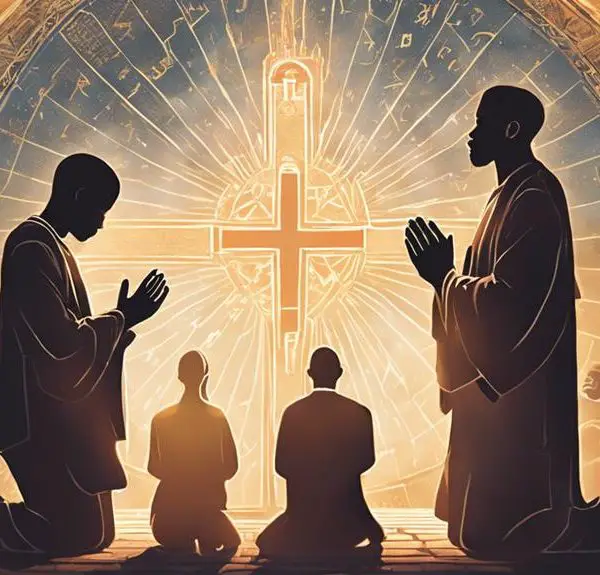
Sign up